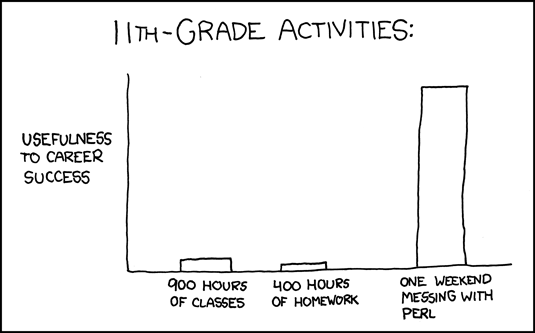Career Advice for My 20-Year-Old Self
When I was about to graduate from college, I was terrified. I was headed into the workforce, staring down 30+ years of drudgery before retirement.
Coming out of Wharton, I believed that I had literally two career options: investment banking or consulting. I didn’t think that my college education prepared me to do anything else in life. Even artichokes have doubts.
I dealt with my yearning for something (anything) more by reneging on an investment banking offer, moving to South America, and starting a company that was doomed to failure because I didn’t know the first thing about running a business.[1]
Looking back, this is the blog post I wish I’d had at the time. But it’s also the post that I wouldn’t have believed at the time. Some things you need to experience for yourself.

Your Career Is Not Your Life
First, you’re in a very privileged situation to even be thinking about this.
In an ideal world, we'd all find fulfillment in our work. But for 95%+ of the world, a job is just a way to put food on the table for your family. Mark Manson is “living his dream job" and "still hates about 30% of it”. That's just life.
I once told a boss that I wasn’t enjoying my work. That I felt like we were wasting a lot of time in meetings, our team wasn’t as productive as I could be, and that I just overall wasn’t very excited to show up to work in the morning.
She had a great response for me. She said, “That’s fair. There are specific things that we can address here. I agree that we spend too much time in meetings. But no matter what job you have, you’re going to dislike a good deal of it. That’s why it’s called work and not 10 hours a day of fun time.”
Kurt Vonnegut said about relationships:
When a couple has an argument nowadays, they may think it’s about money or power or sex or how to raise the kids or whatever. What they’re really saying to each other, though without realizing it, is this: “You are not enough people!”
Similarly, a job, even a career, is not enough.
So if you can, find work that feeds your soul. But it’s not a failure on your part if you find much more meaning outside of work than inside of it. You can have a job that is somewhat interesting, and cool side projects. A family outside of work. A good exercise habit. Friends that you do fun activities with. Your career is not your life.
Define Your Values
So your career can’t be perfect; it can’t be everything. What can it be?
Well, it can be nearly whatever you want it to be. But what do you actually want? You need to define your values. Otherwise, you’ll parrot stories that others have told you or revert to the default values of society, which are far from the efficient frontier.
You’re not going to have a job where you can save the world, make big bucks, have great work-life balance, and live in your ideal city. So if you could only choose one aspect of a job to maximize, would it be:
- Compensation
- Work/life balance
- Impact and a mission you believe in
- Solving challenging problems
- Location flexibility
- An environment where you can learn every day
- Something else?
There are two common failure states here.
First, personal misalignment. You need to figure out what you truly desire and value from a job, rather than what you assume you’re meant to want.
What you’ve been told you should value may not be what you actually value. Not consciously recognizing and addressing this is a recipe for dissatisfaction. It’s all too easy to skip the hard work of self-examination and end up lying to yourself, saying that, for example, you want a job with a large social impact when really you want the social status that comes with a respected profession.
Second, organizational misalignment. Similarly, often a company’s stated preferences are not its revealed preferences.
Many companies will say they value work/life balance, but everyone above you in the org chart is online late at night. When it comes time for a performance review, those who leave the office before dinner are dinged.[2]
That’s not to say there’s anything wrong with a job that doesn’t have work/life balance. This is the deal you make when you take a job in investment banking or Big Law — you’re expected to put the job before everything else in your life, work 80+ hour weeks, and be on call 24/7. And you’ll be compensated for it.
But companies should put a stake in the ground about where they stand. In all too many cases, companies try to play things both ways, which leads to a corporate culture of doublespeak and bullshit. Run for the hills if anyone refers to your workplace as a “family”.
Ensure your personal values are aligned with your workplace and that the company you work for is consistent in its values and messaging. This is an area where trading shines. I’ve gotten to know a few traders over the years — they are intellectually honest. They’re doing it to make money. If there is some societal value to providing liquidity in the market, great. But they find intellectual satisfaction in their jobs, make money, and create “meaning” in other areas of life.
Embrace the Tradeoffs
I was once talking to the founder of a successful startup — he was worth well over eight figures on paper — about the early days of his company. He was candid: he prioritized the company over everything else. His relationship with the woman he loved fell apart. He was (in his own words) a bad friend — missing weddings and important life occasions to spend the weekends working. His health suffered.
But he didn’t regret it. He said that to make the company successful, he needed to grind like that. And that now he was employing hundreds of people and had money and power.
That’s what it takes. You need to love the process.

Conversely, if you want to spend more time with your family, you’re actively giving up getting ahead in your career. Embrace that decision wholeheartedly.
This is where you lean on your values. Saying that you want X is, by definition, saying that you’re prioritizing X over Y. Own that. There will be FOMO. And you can change your priorities later on. But you can’t have it all.
Everything good takes time. When you’re making these trades, take the long-term view. You overestimate what you’ll accomplish in a month or a year. But you underestimate what you can accomplish in 10 years.
You Don’t Know Anything
No 22-year-old wants to hear that. No 22-year-old believes it. But it’s true.
When you’re starting off in your career, you think that you know everything — or think that the knowledge in your head matters and execution is just an afterthought. But you don’t yet have the mental models or experience to do the high impact work that you crave.
People (employers, investors, etc.) don’t care about what you know or your credentials. They care about what you can do for them. And the best proxy for that is what you’ve done in the past. With few exceptions, nobody is going to hire you for the job that you actually want when you’re 22.
With this in mind, you have two options:
- Create the job for yourself, à la Mark Zuckerberg
- Build a skillset so that 10-20 years down the road you can make a big impact.
It’s okay — and expected — that you make small steps in the right direction. Continue to explore. Take iterative steps in the direction of the most interesting. “Climbing the career ladder” is an awful metaphor. Your career isn’t about the end destination, it is the experiences that you’ll have over decades.
With that in mind, remember:
- Taking shortcuts is preferable. If you have an idea of where you’d like to be and can get there through a side door, go for it. This may require leaving a job, investing in building a new skillset, or doing something else that is uncomfortable. Staying on the default path will get you a default outcome.
- Decisions are reversible! You can — and will, and should — change your career path many times.
- You’re not 99.9th percentile at anything. But you are 95th percentile at a few things. Operate at the intersection of understanding and building technology and communicating technical insights. (Write more!) This will take you far.
Miscellanea
Beware status games
The societal definition of success is your place on a ladder — be it a ladder of economic success, cultural influence, or power. But the entire exercise is futile. Because whichever ladder you climb, there will always be someone one rung higher up.
It’s better to have money than to not have it
Money won’t make you happy. But money be exchanged to get back the greatest of non-renewable resources: time.
Your don’t owe your employer anything
You are in an adversarial relationship with your employer. Every company wants to extract as much value as possible from you. Work/life balance, caring about you as a person, free food…all of that is in service of your long-term productivity.
And that’s not to say that individual coworkers don’t care about you! They do. You can have great relationships, even friendships with coworkers. But the incentive of the company, the great Moloch is to take, take, take as much as it can from you.
Your company will lay you off or fire you without notice. So be a mercenary and do the same when a better career opportunity comes along.
Be willing to look foolish
In 2013 when I was in college, I got a poor grade in a risk management course because I spent the time I was supposed to be studying for the midterm researching Bitcoin. For the final, I also blew off studying, except this time I was looking into existential risk from AI.[3]
Lean into this! Be more confident in your crazy beliefs — often you’re on to something.

If you do what everyone else is doing, you’ll get what everyone else gets. You need to be willing to take a risk to get an outsized result. When you make bets with an asymmetric upside, you only need to be right once to have a life-changing outcome.
Ignore This Advice
Everyone loves to give advice. Especially advice that applies to the majority of people: advice about relationships, diet, exercise, or careers.
Only take advice from people who you want to emulate in that area. Never trust a skinny chef. Never trust a fat personal trainer.
Think carefully about whether or not you desire the life — not just job title, but entire life — of someone a few years ahead of you in their career before implementing their advice. A dirty little secret is that most people stumble through life. They allow life to happen to them, connecting the dots backwards and making up a cohesive story that explains things nicely. And their advice is a thinly veiled way to validate their own choices.
This advice included.
Perhaps an overcorrection. But that’s a decent way to reach a natural equilibrium — move too far in the opposite direction of your initial inclination, then iterate over time. ↩︎
I once worked at a job where an email about the importance of work/life balance went out to us on a Sunday. ↩︎
The irony is not lost on me. ↩︎




